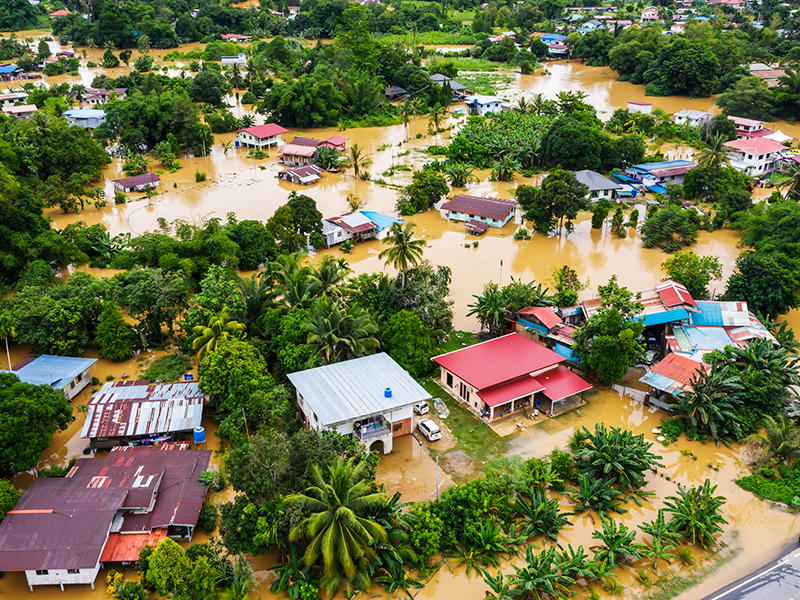
Authors
-

Director, Climate and Nature, BSR
-
David Wei
Former Managing Director, Climate and Nature, BSR
Key Points
- The new IPCC synthesis report shows that we must speed up the scale and pace of climate action.
- Scaling effective and equitable climate action now will reduce harm to nature and people.
- We outline six key ways business can take credible, effective action to meet the moment.
This week, the Intergovernmental Panel on Climate Change (IPCC) released the final part of its Sixth Assessment Report, which is intended to inform government climate targets and in-country policy planning. The synthesis report, approved by 195 countries, paints a stark picture of the climate crisis and draws a narrow path to a liveable and sustainable future. UN Secretary-General António Guterres simultaneously launched the Acceleration Agenda, a set of clear and urgent measures to tackle the climate change “time bomb.” Together, these are a powerful guide for credible corporate climate action in the decisive decade.
Key IPCC Takeaways
- Global greenhouse gas (GHG) emissions have continued to increase with “unequal historical and ongoing contributions.” The world has reached 1.1°C of warming, and current policies are projected to result in global warming of 3.2°C by the end of the century. “Global warming is more likely than not to reach 1.5°C” under any scenario in the near future.
- “Climate change is a threat to human well-being and planetary health.” We need immediate and coordinated action across sectors to secure a livable and sustainable future for all. Limiting human-caused global warming requires net-zero CO2 emissions, and decarbonization across the value chain is key.
- Human-related climate change is currently affecting weather and climate extremes, with clear impacts to nature, people, and the economy. Climate impacts are more severe than previously expected and will accelerate with increased warming.
- Mitigation solutions exist and “maintaining emission-intensive systems may, in some regions and sectors, be more expensive than transitioning to low emission systems.”
- The increase in cumulative emissions makes some changes to our climate unavoidable and irreversible. But not changing course would increase “the likelihood of abrupt and/or irreversible changes, including…when tipping points are reached.”
- To deliver 1.5°C, we need “deep, rapid and sustained mitigation and accelerated implementation of adaptation actions in this decade.” This will require considerable upfront investment and “large and sometimes disruptive changes in existing economic structures, with significant distributional consequences within and between countries.”
- Climate change disproportionately impacts the global population, and approximately 3.3–3.6 billion people are highly vulnerable. The economic impacts of climate change are most visible in the agriculture, forestry, fishery, energy, and tourism industries.
- It is fundamental to focus on “equity, climate justice, social justice, inclusion and just transition processes” and to promote cooperation when implementing adaptation and ambitious mitigation.
- Several options exist to address “emission-intensive consumption” that require behavior and lifestyle changes, but bring overall societal well-being.
- If we overshoot 1.5°C, global warming could “gradually be reduced again by achieving and sustaining net negative global CO2 emissions.” But generating negative emissions comes with larger concerns; and the overshoot will still generate irreversible impacts and risks for humans and nature.
The world is not adapting fast enough to climate impacts, and this gap “will continue to grow.” The key barriers are lack of finance and engagement from both the private and public sector. Adaptation solutions that work now will become “constrained and less effective” as warming increases.
The Acceleration Agenda
In response to the IPCC report, UN Secretary-General Guterres’ Acceleration Agenda advances specific measures to phase out fossil fuels, including the following. These begin to determine how success at the UN Climate Conference this year (COP28) in Dubai will be measured.
- No new coal, and the end of all international public and private funding of coal and of licensing or funding for new oil and gas.
- Net-zero electricity generation by 2035 for all developed countries and 2040 for the rest of the world
- A halt to the expansion of existing oil and gas reserves.
- A shift in subsidies from fossil fuels to a just energy transition
- A global phase-down of existing oil and gas production, compatible with the 2050 global net-zero target.
Company Action That Meets the Moment
With the IPCC report and Acceleration Agenda pointing to an urgent path forward, businesses can respond to their call with climate action commensurate to the latest science.
1. Embrace 1.5°C as a floor and accelerate delivery across the value chain
The narrowing path toward 1.5°C is no reason to retreat. On the contrary, accelerating value chain reductions will limit climate impacts. Business and governments alike need to deliver decarbonization commensurate with the change required by science. This will require transformation of business models as much as incremental reductions during this decade. Areas of immediate focus include transitioning away from fossil fuels; creating and implementing clear, transparent and robust climate transition plans; and accelerating delivery of scope 3 goals.
2. Redefine business growth within planetary boundaries
In a recent blog, we suggested it was time for companies to move beyond incremental change and explore the tension between business growth and sustainability goals which align with our planet’s boundaries. This requires an evolution in mindset and in business models to thrive within planetary boundaries.
3. Move from assessing risks to implementing adaptation solutions
The IPCC report recognizes that climate impacts are proving more severe than previously thought and will grow even more severe as global warming continues, potentially creating compound and cascading effects that are difficult to predict. Still, adaptation is absent in most business and climate strategies. Implementing adaptation solutions, including leveraging nature, will be key to limiting impacts on the workforce, surrounding communities, and global supply chains.
4. Develop holistic solutions centered around climate justice, just transition, and nature
The IPCC points out examples of “maladaptation” that blunt climate impacts but cause negative social impacts or impacts to nature. To avoid this, businesses can work toward climate justice by considering people and vulnerable communities in their climate strategies and implementation plans and integrating nature-positive solutions in their climate strategies.
5. Advocate for strong climate policy
Current policies are insufficient to avoid climate catastrophe, and we have yet to advance policies that will enable a just transition. Business can and should support climate policy at the national level in material jurisdictions and at the international level, e.g., through the We Mean Business Coalition. At the same time, it is key that businesses engage with, or withdraw from, trade associations that act against climate policy.
6. Financing climate solutions and stopping harmful funding
Finance flows are needed to tremendously accelerate to support deep emissions cuts and adaptation in the very short term. Business can direct investment to support real climate solutions, including nature and scaling removals.
At the same time, the financial sector can and should drastically accelerate the redirection of financial flows away from harmful investments (such as fossil fuel infrastructure) toward scaling climate solutions.
Business Resilience in the Coming Years
The IPCC’s Sixth Assessment Report not only intensifies the climate and sustainability agenda; it reminds us that climate impacts will continue to worsen as we advance, tenth of a degree by tenth of a degree, toward and past safe thresholds for our planet. Business will do more than they have before while they face increasing stakeholder pressure. As the climate deteriorates, business can focus on cross-cutting sustainability issues, from redefining business growth, to developing holistic policies, to implementing new adaptation solutions, all of which will meet the moment with credible action.
BSR’s latest sustainability insights and events straight to your inbox.
Topics
Let’s talk about how BSR can help you to transform your business and achieve your sustainability goals.







